Adult braces: Why are more grown-ups getting their teeth straightened?
- Published
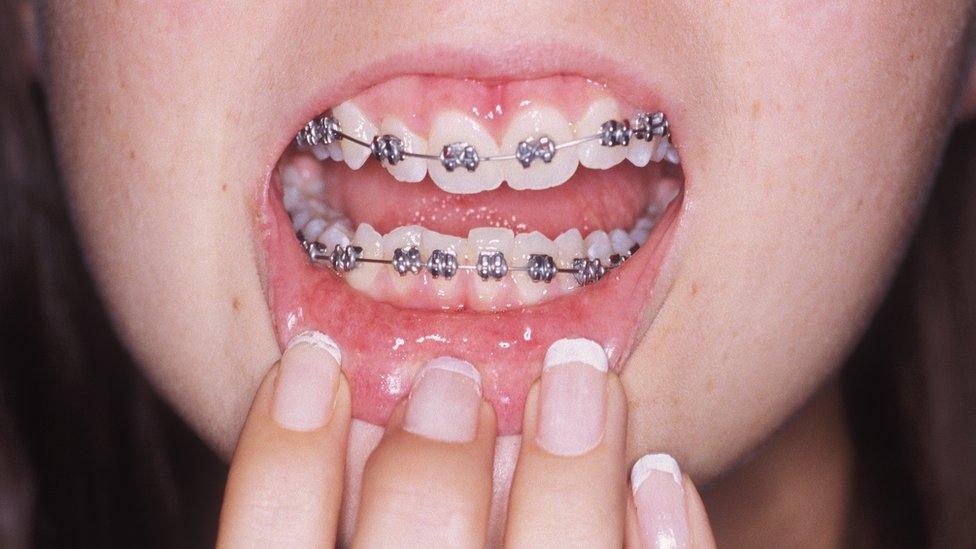
Orthodontists say the number of adults with braces is increasing
Once seen as a treatment for teenagers, more and more adults are now wearing braces. Orthodontists say grown-ups are flocking through their doors for teeth-straightening despite it often costing thousands and taking months or years to complete. So what's motivating people to chase the perfect smile?
Braces are big business.
According to the British Orthodontic Society (BOS), three quarters of their members say they're seeing more grown-ups coming through their doors.
Amid the rush to keep pace with demand, many have been expanding and buying new equipment - a trend that saw Barclays bank almost double its loans to dentists in two years.
Some say the gleaming smiles seen on Instagram feeds and reality TV shows are behind the rise, while others say it's just become more socially acceptable for adults to wear them.
But what do the people wearing them say?
'Celebrities made it cooler'
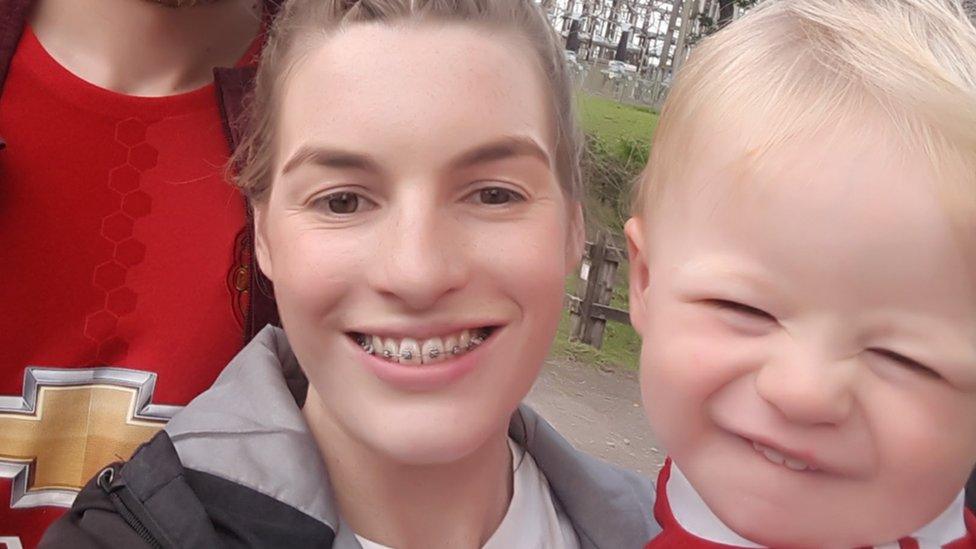
Lucy Setter, with her son Albert, said she had been affected by "perfect pictures of people" on Instagram
Lucy Setter was 27 when she had her braces fitted.
She had just given birth for the second time, and wanted to focus on herself after "being a mum all the time".
"It was just something for me," she said.
She said she first visited an orthodontist aged 14, but was scared off when told she would need a head brace.
"I used to watch [the Nickelodeon cartoon] Hey Arnold! as a child and there was a kid on there with a head brace. I was thinking: 'Oh my god, I'm never going to have any friends again'."
Aged 19, she returned, having grown in self-confidence, but discovered that, in most cases, treatment is not covered by the NHS for over-18s, external.
Lucy, from Torquay, Devon, said watching a wave of flawless selfies scroll across her Instagram feed helped to persuade her to take the plunge.
"Perfect pictures of people are being put up all the time and I thought: 'I can't smile because of my teeth'."
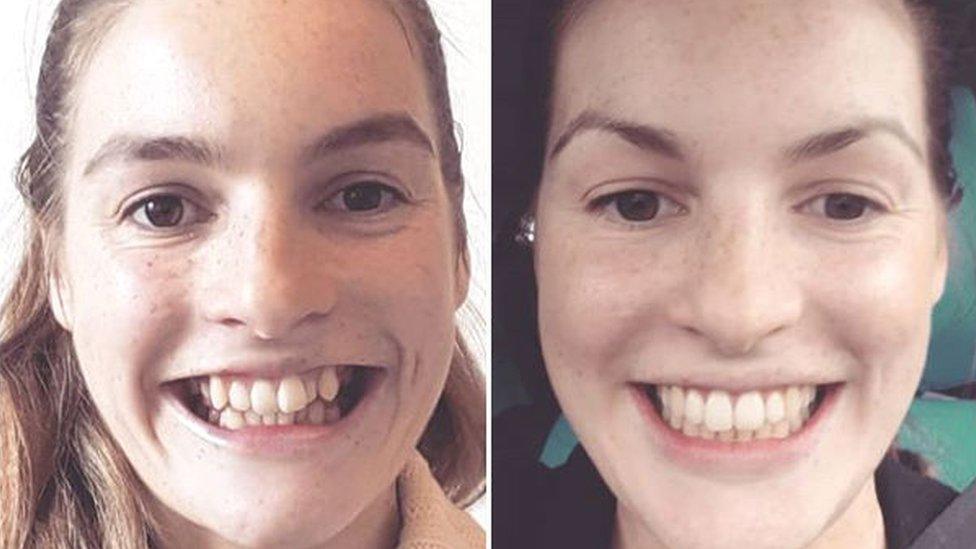
Before and after: Lucy Setter was 29 when her braces were removed after nearly two years
She found an orthodontist who offered an interest-free payment plan and, in November 2016, put down an £800 deposit, followed by £135 monthly payments.
Now 29 and a mum-of-four (she gave birth to twins shortly before the braces were removed in October 2018) Lucy said she was "a lot more confident now".
"I used to smile with my mouth shut. I'm a lot more confident now. It's in all aspects of my life. In an interview, or something like that, it makes me confident."
It helped that celebrities such as presenter Fearne Cotton, who posted about her own braces in 2016, external, had "made it more cool" she said.
"Back in my day, it wasn't cool at all."
'It's not a vanity thing'
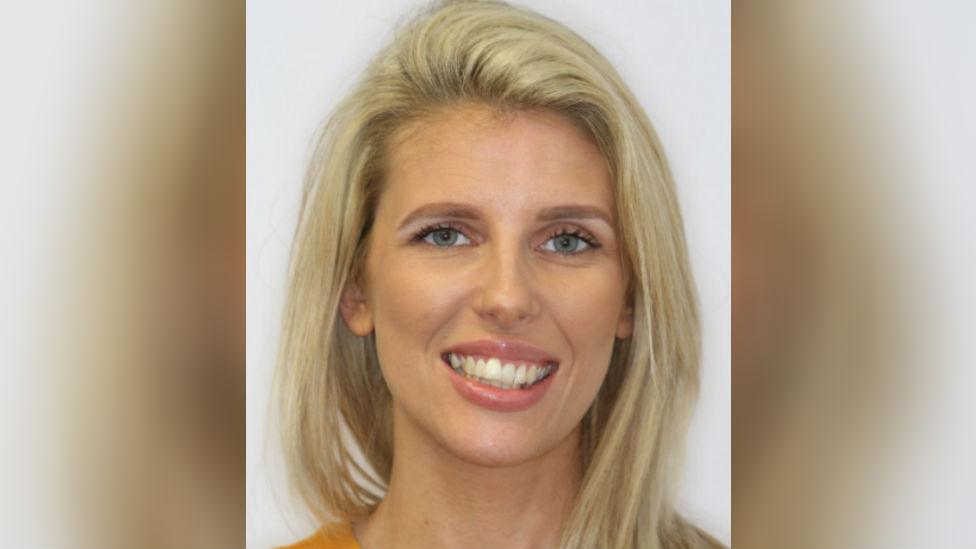
Hannah Bailey said she was "going for straight teeth, not the Hollywood smile"
Hannah Bailey, 31, has wanted to straighten her teeth since she was a child, but said she could only now afford the £3,400 fees.
"I wasn't bullied, but people would say things like horse teeth.
"That always stayed with me," she said.
"I avoid smiling, I hold my hand up to my mouth when I laugh, so it will be quite life-changing."
The self-employed childminder, from Maidstone in Kent, is part-way through a six-month treatment.
Despite being self-conscious about her teeth as a teenager, the fear of braces drawing unwanted attention turned her off, she said.
Since having them fitted, the response from friends and family had been overwhelmingly positive, she said.
However, she fears some people will view her decision as vain and similar to having plastic surgery.
"It's strange. As children you are encouraged by dentists [to have your teeth straightened], but when you are an adult people think it's a vanity thing."
While she understands how "textbook perfect" celebrity smiles can inspire self-consciousness, Hannah says they did not influence her.
"What I'm going for is straight teeth, not the Hollywood smile."
'Rare to see a man with braces'
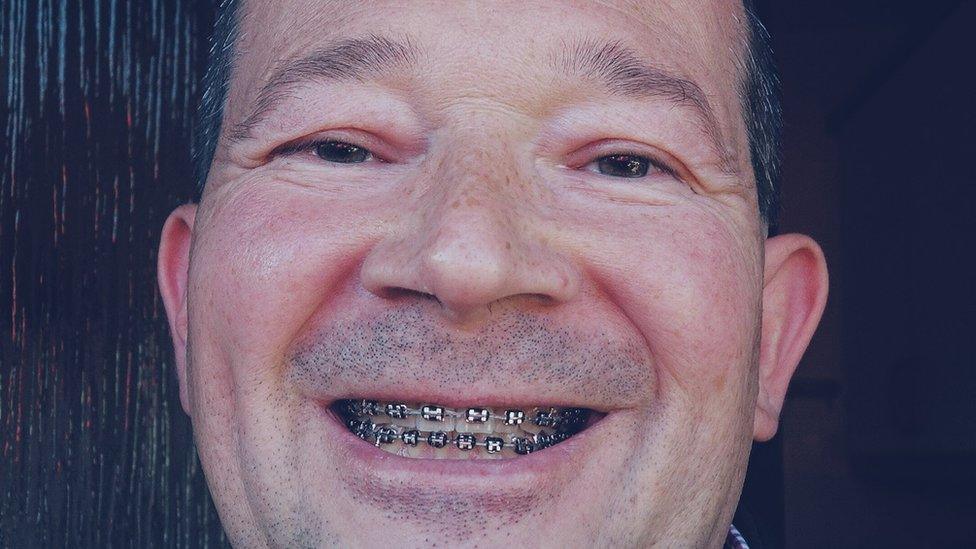
Neil Hillyard was 45 when he had traditional metal braces fitted
Neil Hillyard, 52, was in his mid-forties when he had braces fitted.
After getting fed up with crowded teeth that had been "bugging him for a while", in 2013 he decided: "If I don't do it now, I'm never going to do it".
Neil, from Inverness, Scotland, had considered getting braces in his early twenties, but found treatment inaccessible "unless you were a particularly bad case".
"Now you can walk into an orthodontic practice and it's very accessible and very socially acceptable. There's a lot more opportunities than there was twenty years ago."
According to the BOS survey, he is not alone in having treatment in his forties.
It said 80% per cent of adults with braces are aged between 26 and 55, although women make up the vast majority - 80% - of cases
Mr Hillyard said he had been "well aware that it was very unusual" for men to have braces and felt "terrified" beforehand.
"But once I got over that, it wasn't a barrier at all," he said.
"Living in the Highlands of Scotland, it was a rarity to see another man [with braces], I can't recall ever seeing anyone else."
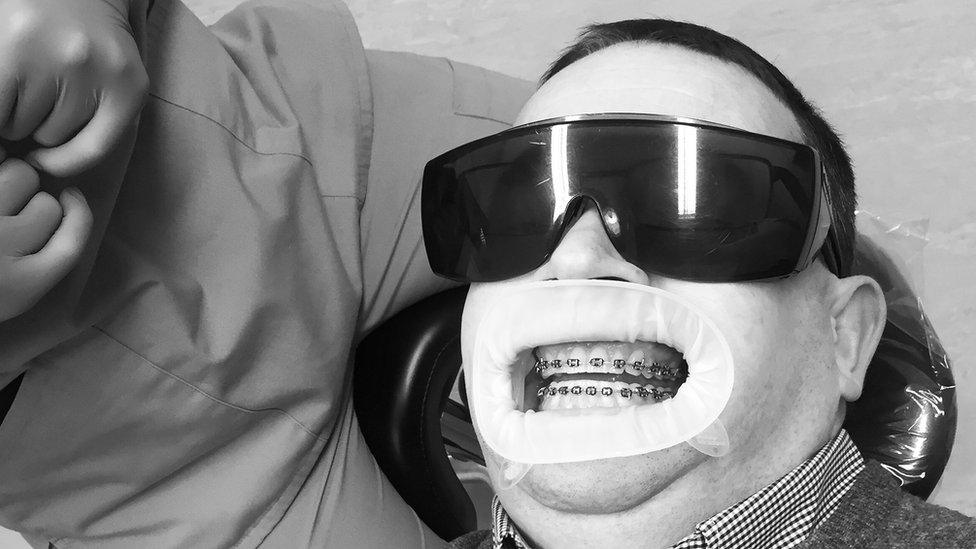
Mr Hillyard, who went on to start the UK Adult Braces blog, said having orthodontic treatment was "one of the best decisions he had ever made".
"The thing that really surprised me is: no one cared less. I thought everyone would notice. No one really mentioned it, but when you brought it up they chatted quite happily and said they wish they had the confidence."
Is teeth straightening safe?
While orthodontic treatment "usually works very well", patients will need to wear a retainer for years afterwards to stop teeth moving back to their original position, according to the NHS.
It also says that braces are only suitable for people with healthy teeth and gums, and warns that they can trap food and cause more plaque to build up.
They can also be expensive. The BOS says prices can "vary widely", while the NHS says private fees are usually about £2,500 but can be much higher.
There are concerns that the high cost and increased demand is causing people to seek out less reputable providers.
So far this year, the General Dental Council has successfully prosecuted five people for illegally offering teeth whitening without the necessary qualifications.
Meanwhile, the BOS said it was "extremely concerned" about the advent of DIY braces, where patients are sent devices in the post based upon scans of their teeth.
Peter McCallum, an orthodontist of 30 years, said: "There is a very good reason why you go to see your doctor if you have a problem.
"Equally there's a good reason you go to see your dentist if you want a problem fixed with your teeth."
Last year, the Advertising Standards Agency said businesses offering teeth straightening must not claim their techniques were "less painful" or had a "faster effect" than traditional braces.
It took action against three websites offering procedures.
Many orthodontists offer fixed-term payment plans, but patients are advised to check the small print.
Any practice charging interest or offering payment plans of more than 12 months must be registered with the Financial Conduct Authority.
You may also like:
What do the professionals say?
Nina Shaffie, an orthodontist at The Sandford practice in Bexleyheath, said she had "seen a sudden rise in adult patients".
While she feels the "archaic stereotype that braces are for teenagers is finally being broken down", she also believes "increased integration of social media into our daily lives" and interest in reality TV shows had contributed.
Adult patients often came in "requesting a certain celebrity's smile", she said, and mentioned programmes including Love Island, The Only Way is Essex and Made in Chelsea.
Hours spent browsing Instagram images of people with the "perfect body image" created a "warped perception of reality", she warned, with people unaware of the hours spent trying to capture the "perfect selfie".
BOS board member Mr McCallum said greater awareness and more discreet braces had also driven the rise.
Previously, adult braces were only used by those with a "very complex problem", but today people simply wanted to change the appearance of their teeth, he said.
New treatments, including transparent, removable devices and braces fitted behind the teeth, were more socially acceptable, he said.
- Published27 May 2015
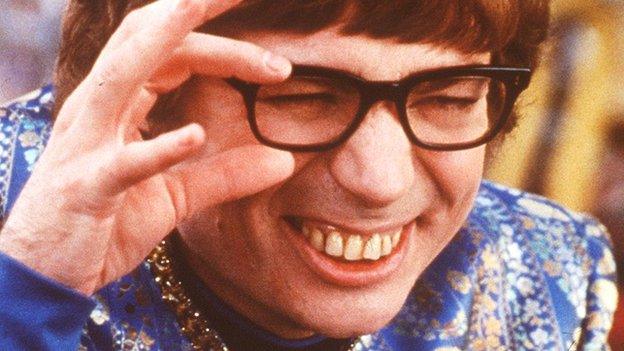
- Published15 August 2019

- Published6 September 2017
